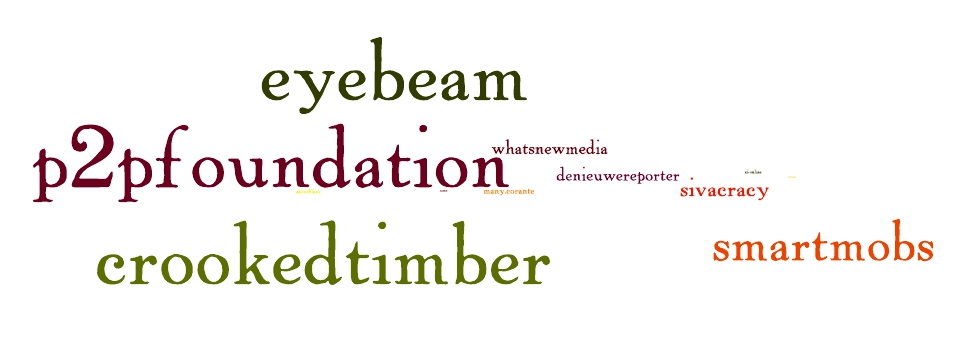‘Masters of Media’ on the Web
According to the 2010 call for New Media MA applications, the Masters of Media blog has been nominated for a best education blog award and enjoys a broad, global readership. Masters of Media‘s international prestige and academic acclaim undoubtedly point to an extensive Web presence. But how many mentions does it exactly get and why do they matter?
Who’s linking to it? What kind of network do the websites linking to MoM form? Do those inlinked in the blogroll return the favour and mention MoM? In this post I will try to briefly address some of these questions.
Before starting, it is important to say why linking matters. Associational sociology maintains that “ties are reputational indicators” (1) Whether those linking to one’s website are friendly or not is not relevant in this context; what is worth analyzing is the link’s function of “providing empowering pathways, or clues for successful networking” (2). That is to say, receiving many links does not necessarily mean that people appreciate or disagree with the content of a blog, for example, but that a particular presence is acknowledged and integrated into a broader network.
Going back to the Masters of Media blog, a Yahoo! Site Explorer query shows that the site gets 10, 893 inlinks from 7, 298 pages. Avoiding self-referentiality is essential so the results coming from the queried domain were excluded. To make sure that all posts under the MoM umbrella were included, the query referred to the entire site and all its subpages. It should however be kept in mind that many of these still come from affiliates such as the Institute of Network Cultures, the Digital Methods Initiative or Universiteit van Amsterdam-related departments or administration. To zoom out of this closed network, I decided to zoom in on the first 1000 results of the aforementioned query and manually remove such links. The clean-up operation left 105 distinct websites linking to the blog in one form or another. These 105 comprise of New Media MA students’ personal blogs (such as Nicola Bozzi or Sjoerd Tuinema‘s), sites of new media scholars (like danah boyd), and collaborative academic blogs (whats new media?, for example), among others.
As for the number of mentions the blog gets from its collaborative roll, the MoM blog is doing fairly well with Eyebeam, Crooked Timber and the P2P Foundation giving 100 shout outs each (please see tag cloud). However, things are not looking bright from the individual blog roll with all blogs referring to MoM under ten times or not at all (see respective tag cloud). I should also mention that the blogs must be queried for actual links to any Masters of Media post – a more complex task – so as to get a broader picture of who is actually pointing its own readership to this blog.
‘masters of media – Collaborative Blogroll Mentions

Some would argue that link has been replaced as a currency of the Web by social media-inspired ways of organizing content such as the ‘share’ or ‘like’ button (3). Thus, another approach would see how the blog is acknowledged on social media platforms like Twitter and Facebook.
Whether the blog would feature prominently on other platforms is not by any means an indicator of its proven quality and academic prestige; linking matters for getting the word out there, for giving as much exposure to the research posted and debated on this blog.
References
(1), (2) Digital Methods Initiative, The Link
(3) Vera Bekema, Carolin Gerlitz, Brittney Fosbrook and Anne Helmond, Web Currencies